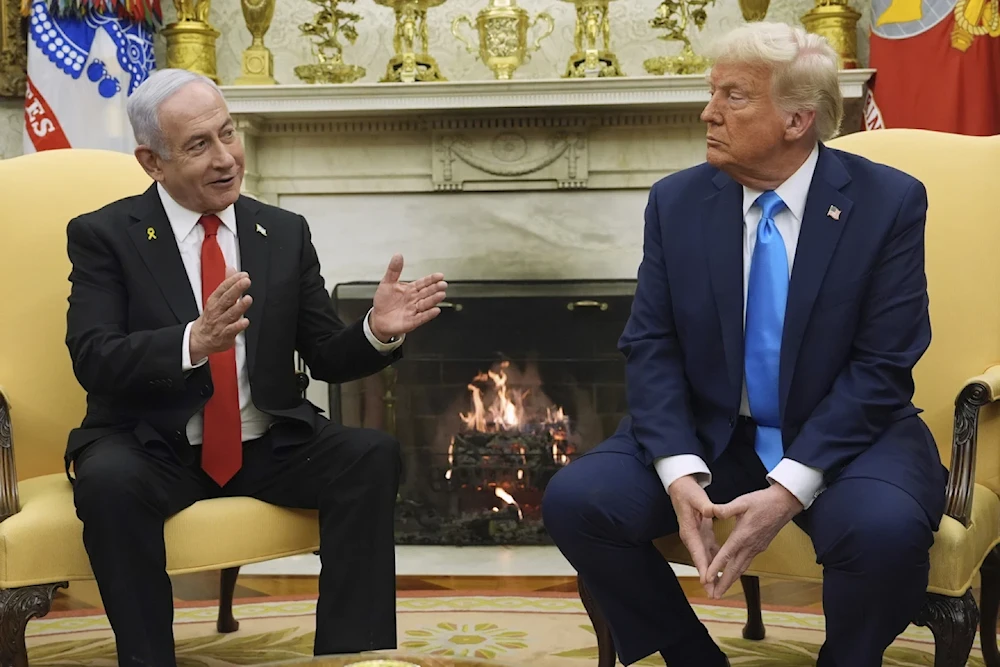Bypassed by Trump, 'Israel' dismayed, silent amid shifting alliances
"Israel’s" silence amid Trump’s Middle East visit highlights a shift in US priorities, as the US president focuses on business deals with Gulf nations and sidelines Israeli concerns over Gaza and Iran.
-

US President Donald Trump meets with the Israeli Occupation States' Prime Minister, Benjamin Netanyahu in the Oval office of the white House, February 4, 2025, in Washington. (AP/Evan Vucci)
"Israel’s" right-wing government has remained diplomatically silent this week as US President Donald Trump fired off a series of announcements that have shaken Israeli assumptions about the US’s standing with its most important ally, Reuters wrote.
Trump’s decision to bypass "Israel" during his current visit to the Middle East has already raised concerns, as his administration’s focus shifts toward lucrative business deals with wealthy Gulf countries, including Qatar, which Israeli officials have long accused of supporting Hamas.
Even before Trump’s visit began, "Israel" was on edge over US talks with Iran and Trump’s decision to halt strikes on the Ansar Allah Resistance group in Yemen, according to Reuters, despite the group’s continued missile strikes against the Israeli occupation.
Israeli officials were then forced to watch as the US negotiated with the Palestinian Resistance group, Hamas, to secure the release of Edan Alexander, the last surviving American-Israeli captive in Gaza.
Following that, Trump declared an end to sanctions on Syria and pushed for the normalization of relations with the Syrian government, which "Israel" views as an extremist regime.
Shifting US priorities: Focus on business deals over security
While Trump spoke in Riyadh on Tuesday, claiming credit for the ceasefire agreement with Yemen's Ansar Allah, Israeli media noted that sirens were sounding across "Israel", including in occupied al-Quds and Tel Aviv, as a missile from Yemen approached. Despite this, Trump dismissed concerns about a rift, stating that his visit would ultimately benefit "Israel", as his relationship with Middle Eastern countries continues to strengthen.
Israeli occupation Prime Minister Benjamin Netanyahu, who has been largely silent on the matter, thanked Trump for helping to secure Alexander’s release but has faced public perception that "Israel", already under international pressure over the Gaza war, has been sidelined in broader Middle East diplomacy.
Netanyahu’s silence and the pressure of hardline factions
The Middle East is undergoing a significant reshaping through agreements and meetings, with "Israel" appearing as an observer on the sidelines. Netanyahu has made no secret of his preference for Trump over former President Joe Biden, especially with Biden’s hesitance to provide heavy munitions and sanctions on violent Israeli settlers.
However, Netanyahu continues to pursue the genocide in Gaza, while a segment of the Israeli occupation's public calls for an end to the prolonged war. Netanyahu's advancements in Syria after the fall of former president Bashar al-Assad, alongside "Israel's" thousands of ceasefire violations against the Lebanese sovereign state, have led to a decline in "Israel's" reputation, now ranking among the lowest in the world, Reuters remarked.
Diverging priorities: Trump’s transactional approach to Middle East diplomacy
Recent events indicate a “clear divergence of priorities” between the US and "Israel", with Trump focused on a transactional, trade-oriented agenda. Jonathan Panikoff, former deputy US national intelligence officer for the Middle East, explained that Trump is determined to move forward with his priorities, regardless of whether they align with traditional US-Israeli security concerns.
While US-Israeli relations remain strong in principle, Trump administration officials have privately expressed frustration with Netanyahu, pushing for a ceasefire in Gaza and a captives deal with the Palestinian Resistance.
The US has also shown little interest in supporting any Israeli military action against Iran’s nuclear facilities while pursuing a diplomatic solution.
The Trump administration has emphasized that "Israel" remains one of the US's closest allies, with National Security Council spokesperson James Hewitt stating, “Israel has had no better friend in its history than President Trump.”
However, the increasing focus on regional business deals and reduced emphasis on traditional political and security matters signals a shift in US-Israeli relations that may affect "Israel’s" role in the future.
As the pressure mounts, Netanyahu has signaled that "Israel" will continue its genocidal campaign against the Gaza Strip, with the latter now facing a severe food shortage due to "Israel's" March 2 blockade. He stubbornly stated, “Israel will not stop and will not surrender.”

 4 Min Read
4 Min Read










